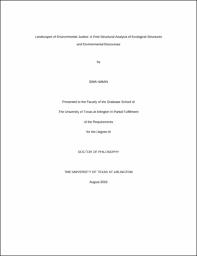
ATTENTION: The works hosted here are being migrated to a new repository that will consolidate resources, improve discoverability, and better show UTA's research impact on the global community. We will update authors as the migration progresses. Please see MavMatrix for more information.
Show simple item record
| dc.contributor.advisor | Arvidson, Enid | |
| dc.creator | Namin, Sima | |
| dc.date.accessioned | 2019-03-22T20:48:10Z | |
| dc.date.available | 2019-03-22T20:48:10Z | |
| dc.date.created | 2016-08 | |
| dc.date.issued | 2016-08-22 | |
| dc.date.submitted | August 2016 | |
| dc.identifier.uri | http://hdl.handle.net/10106/27872 | |
| dc.description.abstract | Although application of ecological concepts and looking at the city as an “ecological space” or ecosystem is not new in planning (e.g. Chicago school), in the context of environmental justice research there is a need for a more integrated approach towards the complex interrelations between human aspects of urban landscapes and urban ecology. Consequently, the first starting point of my research is that studying environmental justice also requires an understanding of environmental health. The second defining point of this research is influenced by the notion of questioning science and research as a “social construct.” Drawing on Foucault’s legacy of discourse analysis, I attempt to point out the importance of the political and social framings of environmental justice and health concerns. Therefore, highlighting one of the most-asked epistemological questions in environmental justice research, “whose knowledge,” I attempt to establish a transdisciplinary framework to include local environmental and health knowledge and perception in the analysis in parallel with the ecological understanding of environmental and human health status.
I apply a landscape-based ecological approach in order to examine the cumulative impacts of landscapes across large areas. Also, I employ a participatory GIS technique along with other qualitative methods to move beyond the traditional geospatial analysis that often does not include participatory approaches and local discourses in its analytical process. Although this study introduces two case studies (South Dallas, TX, and Jamaica Plain, Boston, MA), the ultimate goal is not to provide policy recommendations for a specific case of environmental injustice, but, rather, to highlight the complexity of environmental justice discourse and the epistemological tensions in terms of research methodology in an attempt to attribute these ongoing debates to the politically plural and scientifically vague ontological status of EJ research. | |
| dc.format.mimetype | application/pdf | |
| dc.language.iso | en_US | |
| dc.subject | Environmental justice | |
| dc.subject | Ecological structures | |
| dc.title | Landscapes of Environmental Justice: A Post-Structural Analysis of Ecological Structures and Environmental Discourses | |
| dc.type | Thesis | |
| dc.degree.department | Landscape Architecture | |
| dc.degree.name | Doctor of Philosophy in Urban Planning and Public Policy | |
| dc.date.updated | 2019-03-22T20:48:11Z | |
| thesis.degree.department | Landscape Architecture | |
| thesis.degree.grantor | The University of Texas at Arlington | |
| thesis.degree.level | Doctoral | |
| thesis.degree.name | Doctor of Philosophy in Urban Planning and Public Policy | |
| dc.type.material | text | |
Files in this item
- Name:
- NAMIN-DISSERTATION-2016.pdf
- Size:
- 7.466Mb
- Format:
- PDF
This item appears in the following Collection(s)
Show simple item record


